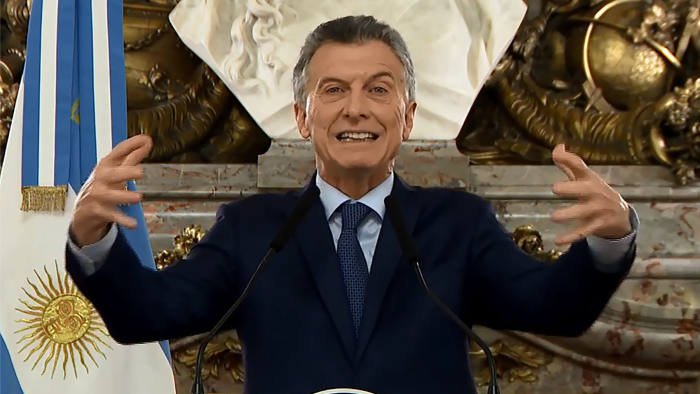Argentina raises taxes in attempt to stem peso crisis
President Macri admits ‘emergency’ after collapse of investor confidence
Benedict Mander in Buenos Aires and Robin Wigglesworth in New York

Argentina’s president Mauricio Macri has unveiled austerity measures as he admitted the country faced an “emergency” in the wake of market panic after the peso’s collapse.
In an impassioned address to the nation from the presidential palace, Mr Macri said Buenos Aires needed to act quickly to restore investor confidence following his request last week for an accelerated $50bn IMF rescue package.
“We believed with excessive optimism that we could go along fixing things bit by bit. But reality shows us that we have to move faster,” said Mr Macri. “The world has told us that we are living beyond our means.”
Nicolás Dujovne, the economy minister, signalled he would quickly try to tighten control of spending, saying the government would next year eliminate its primary fiscal deficit: the gap between spending and income before taking debt servicing into account.
Argentina is to raise taxes and slash its bureaucracy to try to hit the target, which is much more aggressive than a previous plan to lower the deficit to 1.3 per cent next year.
The country has been lashed by a global storm in emerging markets since the peso plunged last week to it lowest level against the dollar, taking its depreciation this year to more than 50 per cent.
The elimination of the fiscal deficit will in part be financed by increasing export taxes, with Mr Macri saying the country needed help from “those who have most capacity to contribute”.
Taxes on exports have been highly contentious for Argentina’s powerful farming sector and Mr Macri had promised this year to continue to reduce taxes on exports of soya. But on Monday Argentina’s president said the crisis was forcing him to implement measures he would prefer to avoid.
“We know that it is a bad tax and it goes against what we want to encourage, but this is an emergency and we need your help,” he said, attributing much of Argentina’s economic problems to external factors, including rising US interest rates and oil prices, the US-China trade war, problems in Turkey and Brazil and the worst drought in almost half a century.
Mr Macri also announced that he would reduce the number of ministries by more than half in an attempt to cut spending, folding more than 10 ministries into others and in effect demoting more than half of his ministers. He described the currency crisis, which erupted in late April, as “the worst five months of my life” after his kidnapping 27 years ago.
Mr Macri said last week he would ask the IMF to speed up disbursement of a planned $50bn support programme to try to protect the country’s finances.
Investors have been looking for the Argentine government to ditch its policy of “gradualism” in reducing its spending, and are likely to welcome the promise to eliminate the primary budget deficit by next year.
“This is the only way they will arrest this crisis,” Federico Kaune, head of emerging market debt at UBS Asset Management, said ahead of Mr Dujovne’s announcement. “They need to show that the strategy has changed from gradualism to a more orthodox fiscal tightening.”
However, fund managers say that, after a series of mis-steps and a worsening crisis that has burnt many investors who kept faith with the government, markets will need to see tangible evidence and hard commitments before they dip back into the country.
The peso fell another 3.6 per cent against the dollar on Monday to trade back near the record lows touched last week, despite the government’s announcements.
0 comments:
Publicar un comentario